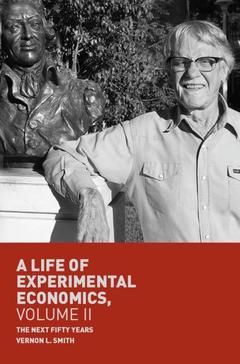Description
A Life of Experimental Economics, Volume II, 1st ed. 2018
The Next Fifty Years
Language: English
Subject for A Life of Experimental Economics, Volume II:
Support: Print on demand
Description
/li>Contents
/li>Biography
/li>Comment
/li>
This sequel to A Life of Experimental Economics, Volume I, continues the intimate history of Vernon Smith?s personal and professional maturation after a dozen years at Purdue. The scene now shifts to twenty-six transformative years at the University of Arizona, then to George Mason University, and his recognition by the Nobel Prize Committee in 2002. The book ends with his most recent decade at Chapman University.
At Arizona Vernon and his students studied asset trading markets and learned how wrong it had been to suppose that price bubbles could not occur where markets were full-information transparent. Their work in computerization of the lab facilitated very complex supply and demand experiments in natural gas pipeline, communication and electricity markets that paved the way for implementing, through decentralized market processes, the liberalization of industries traditionally believed to be ?natural? monopolies. The ?Smart ComputerAssisted Market? was born. Smith?s move to George Mason University greatly facilitated government and industry work in tandem with various public and private entities, whereas his relocation to Chapman University coincided with the Great Recession, whose similarity with the Depression was evident in his research. There he integrated two fundamental kinds of markets with laboratory experiments: Consumer non-durables, the supply and demand for which was stable in the lab and in the economy, and durable assets whose bubble tendencies made them unstable in the lab as well as in the economy?witness the great housing-mortgage market bubble run-up of 1997-2007.
This book?s conversational style and emphasis on the backstory of published research accomplishments allows readers an exclusive peak into how and why economists pursue their work. It?s a must-read for those interested in experimental economics, the housing crisis, and economic history.




